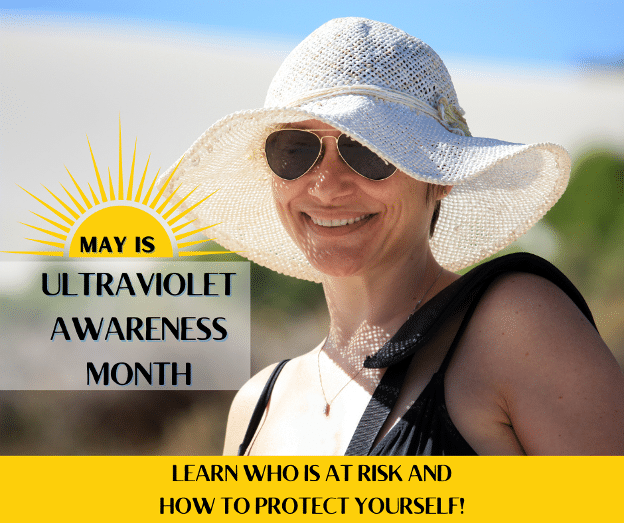Home » Blog » May is Ultraviolet Awareness Month
May is Ultraviolet Awareness Month
Posted by: South Georgia / North Florida Eye Partners in Eye Health

As we eagerly anticipate the arrival of summer, it’s also a time to shine a light on the significance of Ultraviolet Awareness Month. May, as designated by Prevent Blindness, is a crucial period to enhance our understanding of the detrimental impact of UV rays on our eyes and vision. We’re delighted to share this vital information with you and encourage you to share it with your peers.
Many of us love spending time outdoors, especially on sunny days. However, it is crucial to remember to protect our skin and eyes from the sun’s harmful effects. The sun emits radiation in the form of ultraviolet (UV) A and UV-B rays. UV-A rays can cause long-term damage to the eyes, while UV-B rays can cause immediate damage, such as sunburn. Both types of UV rays can cause damage to our eyes, including cataracts, macular degeneration, and certain types of eye cancer.
Who Is at Risk?
Everyone should protect themselves from harmful UV rays regardless of age or skin pigmentation. UV-blocking sunglasses and wide-brim hats are effective tools for this. Sunglasses with UV protection can block 99-100% of UVA and UVB rays, while wide-brim hats provide additional shade and protection for the eyes and face.
The American Academy of Ophthalmology has identified three types of patients who require extra precautions to protect themselves from UV rays. Here are those patients:
Do you have blue, green, or hazel eyes?
Patients with light-colored eyes are at a higher risk and should take extra precautions to protect their vision. Some studies have shown that UV exposure and light irises may increase the risk of rare eye cancers, such as melanoma of the iris or uveal melanoma. According to a survey conducted by the American Academy of Ophthalmology, over half of the people in the United States have light-colored eyes, such as blue, green, or hazel. However, fewer than one-third of the respondents were aware that having light eyes increases their risk of developing certain eye diseases.
Prescription Medicines
Listed below are a few medications that may increase your risk of UV sensitivity include:
- Antibiotics containing fluoroquinolones and tetracycline (including doxycycline and Cipro)
- Specific birth control and estrogen pills (including Lovral and Premarin)
- Phenothiazine (an anti-malarial)
- Psoralens (used in treating psoriasis)
- Anti-inflammatory pain relievers — ibuprofen and naproxen sodium have also been shown to cause photosensitivity, though the reaction is rare.
- Photosensitizing medications (medicines that increase sensitivity to sunlight)
Always remember to discuss and inform your eye doctor about the medications you are taking. This proactive step can help ensure your eyes are adequately protected from UV sensitivity.
Patients Who Have Had Cataract Surgery
Over 2 million Americans have undergone cataract surgery, replacing the eye’s natural lens with an intraocular lens (IOL), which can leave the eye more susceptible to UV light. The newer IOLs effectively block UV light, offering more protection than older models. It is essential to consult with an eye doctor and be aware of UV exposure hazards. If you have had cataract surgery, wearing UV-blocking sunglasses and a hat for added protection is recommended.
Wearing sunglasses and a brimmed hat is the best way to protect your eyes from UV rays.

